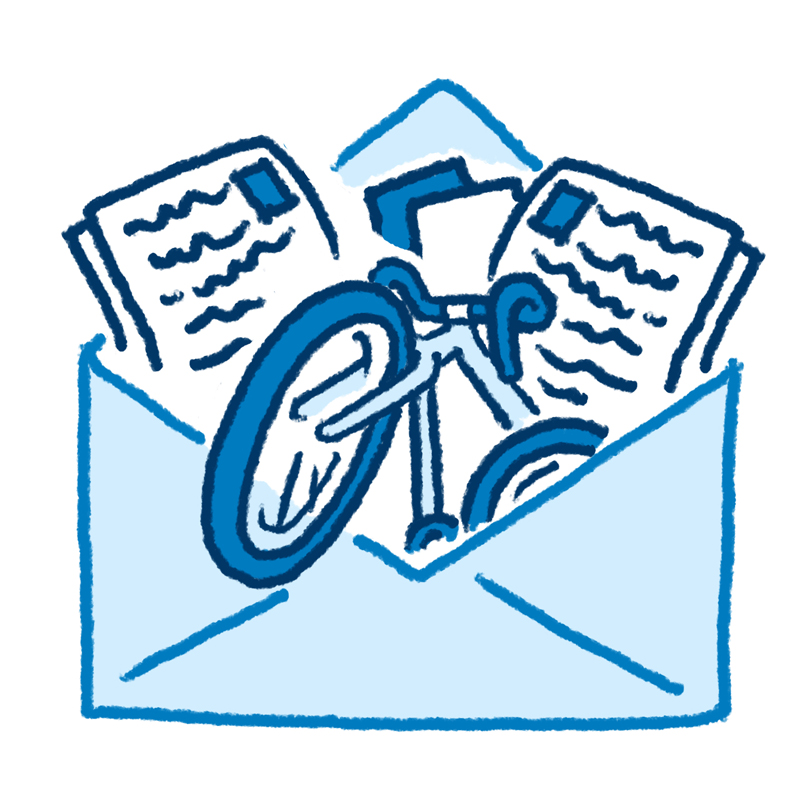Sometimes a Cookie is Enough
This article first appeared in the August/September 2021 issue of Adventure Cyclist magazine.
Had we died? Maybe been run over by a semi on the highway? We were sitting in a hot tub, high atop a rocky precipice on the edge of the ocean, watching an otherworldly sunset, a mist in the early evening sky lending blurred edges to everything, the ocean’s slow undulations rippling with light. In my memory, we were drinking wine in that hot tub. But why would we have wine? Certainly, wine glasses alone were completely out of the question. We were on the first night of a 10-day self-supported bicycle trip down California’s coastal Route 1, my adventuresome friend Elisabeth and I, and packing wine and glasses would have been absurd. But there we were, sipping wine. Wherever we were, with wine or not, it was a welcome, heavenly respite at the end of the most challenging day of our trip, and probably my life.
A San Francisco friend had picked us up at the airport and taken us to a bike shop to unbox and reassemble our bikes. He then drove us south of the city and dropped us off in the middle of nowhere. He chivalrously offered to wait around and make sure we could even get on our bikes once they were loaded down with our luggage, then actually pedal them, but we declined. We’ll be fine! we crowed, a little too energetically. He drove off, and there we were in the silence, a long ribbon of empty, shimmering road stretching beyond us.
Death — ours, or, more specifically, mine — was rather a prominent theme that day. Things were fine in the beginning. We found to our happy surprise that we could pedal without falling over, my shoelaces didn’t get tangled in the sprockets right away, and it was a gorgeous, golden afternoon. The gently rolling road was largely empty. Then we made a fairly ill-considered rest stop. A sign indicated a small store down a hill to the right. This was the first time, but lamentably not the last, that I neglected to calculate the consequences of a thrilling, steep descent, all joy tinged with fear, no pedaling. Down at the bottom of that hundred-foot drop, we met a woman who was back on her bike for the first time in months — years? — since her accident. She showed us her mangled, now healed leg and told us the story of how she had been dragged under a truck on a city street.
“I nearly died,” she added, in a totally unnecessary footnote to the story. I could hardly take my eyes off her leg. I swallowed my terror and with a numb smile wished her all the best, and my friend and I talked of her bravery after she left us.
It probably took us 45 minutes to wrestle our rear-heavy bikes back up that godforsaken hill. We began to bicker about whose idea this clearly idiotic trip had been in the first place. Overcome with misgivings about our foolishness, and graphically aware of our vulnerability on that highway, I slowly began to seethe with annoyance, fear, self-doubt, and heat. And then the hills began.
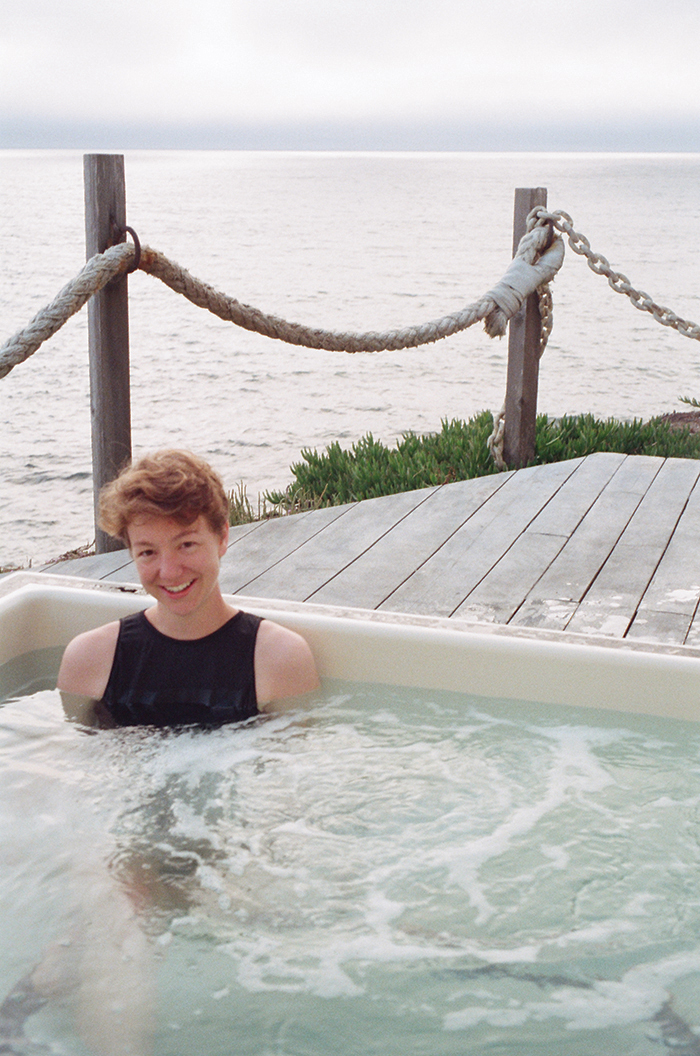
Route 1 is not a mountainous road, although some of it runs along coastal cliffs hundreds of feet above the ocean. But it has long, low-grade hills that seem to ascend forever. It was these grades that afforded me my next contemplation of death. By now I was having a little rougher go than my friend, who seemed to be leaping up the hills like a gamboling lamb. I was humiliated (why couldn’t I keep up?), then grew angry (well I’m sure I’m carrying more weight, after all I’ve got all our food). The sun beat down mercilessly on my back and neck. Our destination, the hostel at Pigeon Point Lighthouse, was 30 miles away at least — no problem on an ordinary bike ride, but hard to imagine on these hills. There wasn’t a car in sight, or a town, or a gas station. We had no cell phones. My arms and legs trembled with the effort of trying to turn my wheels. I worried about my weight distribution, all in the back, causing me to pop an inadvertent wheelie and fall over backward. I worried about getting separated from my friend, who by now was completely out of sight. My anger and self-doubt redoubled their efforts in their competition to fill up the most space in my brain. That companion to fear, anger, and self-doubt — self-loathing — now arrived and assessed the situation as pathetic, the obvious outcome of a poor plan, the only possible redemption being to quit before things got really humiliating.
But quitting was not an option. Not because I am not a quitter. No, simply because it would have been impossible, short of leaving the bike right there on the side of the road and walking the 30 miles to our first night’s stop. Hitchhike? I was even contemplating that, which for a girl who came up in the ’70s with a strong consciousness of Stranger Danger was nearly unthinkable. I began to cry.
All this mental battling began to take a rather extreme physical toll: now my throat constricted from the anger and the tears. I gasped for breath. It felt and sounded like an asthma attack. My arms and legs shook involuntarily. My heart pounded hollowly, angrily, like it might just burst out of my chest and go to some other body, someplace pleasant where less was required of it. In front of me stretched a vast hill, upward into the golden afternoon, shimmering, empty. And my bike, despite my teeth-gritting efforts, had slowed without my noticing to a near-complete stop.
With that power of the will that only accompanies fear for one’s life, I stepped out of my mental anguish in an attempt to consider my situation reasonably. Since I could not breathe, I had to stop. Since my bike wasn’t going any farther, I had to stop. I had to stop, get off the bike, and calm down.
I took small, shallow swallows of air and tried to persuade my throat to relax. I closed my eyes and let the sun warm my face. I listened to the wind in the tall yellow grass. Slowly, my body relaxed as my mind enforced calm. I made a plan. This plan wasn’t exactly rocket science, and it was the idea I admittedly already had, and it was the only possible strategy. But in that moment I felt clever, like MacGyver, or brilliant, like Einstein.
I would get back on my bike and pedal.
So I did. My main priority now was to keep breathing. I didn’t care so much about making the bike go. I didn’t care how far ahead my friend was or that it might take me 10 hours to reach my destination. I just knew I had to stay calm no matter what unless I wanted to asphyxiate. In that effort to breathe, the unwelcome crowd left my mind: humiliation, anger, abandonment, resentment, misgiving, self-doubt, self-loathing. There was room in there for only one thought: breathe.
And as I breathed, I pedaled, and as I pedaled, the wheels turned. Ever so slowly. You could walk much faster than my bike was moving. But I was going, and I was breathing, and I knew then that I would not leave my bike at the side of the road, and I would not die.
As I breathed and pedaled, scarcely moving up the long grade, but moving nonetheless, thoughts rolled into my mind like the ocean lapping onto the shore. I hate for things to be hard. This is hard. Lap. Lap. But I can do this. It’s okay. Lap. Lap. It’s not as hard when I don’t hate it. Lap.
As I pedaled, my heart began to feel lighter. If I didn’t fight the difficulty, if I didn’t resist it, if I didn’t hate it, it wasn’t a struggle.
This was a revelation to me.
All my life I’d hated strife, challenge, difficulty, struggle, hard work, and sweating. Hating it, or thinking I did, I always responded instinctually, viscerally. Get away from difficulty, or fight it. All my life, I had done this. In this moment, I knew that all my life I’d been wrong. The only way out of struggle, it became clearer as I pedaled, was to accept it, to submit to it. This is hard. This is impossible, even. But it’s fine. I’m fine. Do not reject this. Accept it, welcome it, submit to it, and in an instant all that fear, revulsion, and resentment will disappear.
I had always understood every aspect of my life in these terms, that struggle was bad and to be avoided. And when avoidance failed, pain inevitably ensued in the subsequent fight. Moving to Chicago had brought me months or years of pain. Graduate school, difficult every day for seven years, was something of a living hell. And my spiritual life was filled with frustration and sorrow. I hated the struggle and was unwilling to work within a parameter of struggle. Perhaps now I could attempt simply to pedal and breathe, stop fighting, embrace that parameter of struggle in everything. The connections to all aspects of my life rolled into my mind gently, lucidly, freely.
I regret to say that I did not then go faster and faster, ascending to the top of that long grade and stopping to survey all that was beautiful around me in a triumphant moment of oneness with all that is while a crescendo of violins mingled with the song of the ocean. No, I don’t even remember getting to the top. Or getting to our destination. It was a long, barely endurably long, slow afternoon. When I finally arrived at our place of rest — actually a lighthouse that now housed travelers — I felt like a wrung-out rag, semiconscious at best. That hot tub was so surreal, out of context, isolated, and indulgent that even while we sat in it, we had a hard time reconciling and recalling the details of the day.
About that day, I remember almost nothing after this: that when I accept the difficulty, when I embrace the struggle, even submit to it, the wheels will begin to turn and I will not die.
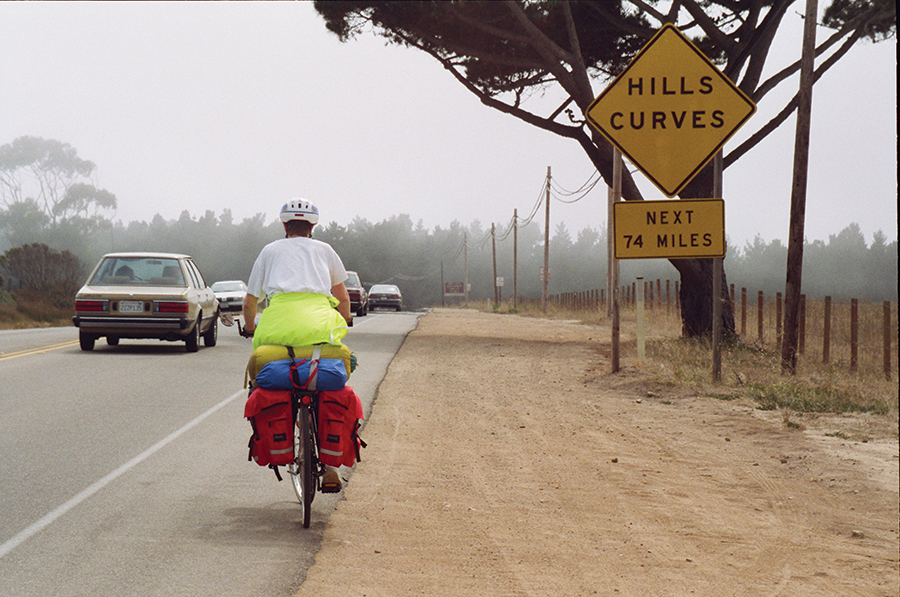
I forgot the fuel.
That is, I chose not to bring it. I couldn’t really fly with it, even in the ’90s, and I assumed that we would find camp stove fuel at every corner store in California.
We never did. Another sore point between us. We ate well; I just had to overcome any natural reticence whenever we arrived at a campground and approach someone better equipped than we were, which was everyone, and beg for space on their stove. I had spent weeks cooking and dehydrating meals at home and packing and labeling our food, and there was no way we were not going to eat it.
We started our days with tea and a heavy bowl of oatmeal, which would load us up for a long and leisurely morning’s ride. Some afternoons we’d stop at a farm stand to pick out some gorgeous California produce, pull out our trusty lump of parmesan cheese (which travels, uncooled, miraculously well), and finish off with a Snickers bar. All these things became essential basic building blocks of life on wheels. What would become of us if we couldn’t restock the parmesan cheese in the next city, or failed to find Snickers bars on the road? Life gets honed down to its most simple form when you travel with all your few goods attached to you and have only the most minimal of daily rhythms: sleep, wake, eat, ride, eat, sleep. And you become aware of only the most basic needs: water; a high-quality block of parmesan; chocolate and peanuts.
By the time we reached our campsite, it was always nearly dark on account of our leisurely pedaling, and while my friend set up camp, I’d go hustle stove space and fix our dinner. And what meals they were. All from an irreplaceable, indispensable, obscure camping cookbook called High Trail Cookery by Linda Frederick Yaffe.
There she is on the back cover, wearing her backpack and looking tanned and strong, with straight ’70s hair and a great big smile. I know why she’s smiling out there in the wilderness — the woman’s a genius. Filled with home-dehydratable foods, her book leans toward the hippie-ish, earthy-grainy, but also includes unexpected dishes like seafood curry with couscous, vegetable jambalaya, chili relleños casserole, and solid standards like black beans with rice.
The night I prepared the black beans, my friend politely did not share with me her hatred of black beans, going all the way back to childhood and a certain bowl of split peas that fomented a rebellion, and a counter-rebellion, in her home.
I stirred and rehydrated, in blissful ignorance. Who doesn’t love black beans? Well, Elisabeth sportingly ate them and found to her shock that she loved them. She loved all the dishes I had dehydrated and brought along. My best cooking audience ever, Elisabeth raved, rejoiced, and thanked me endlessly. Even given that things taste better when you’re camping, I assure you that no one else in the campgrounds ate like we did. All thanks to the brilliant Linda Frederick Yaffe’s High Trail Cookery.
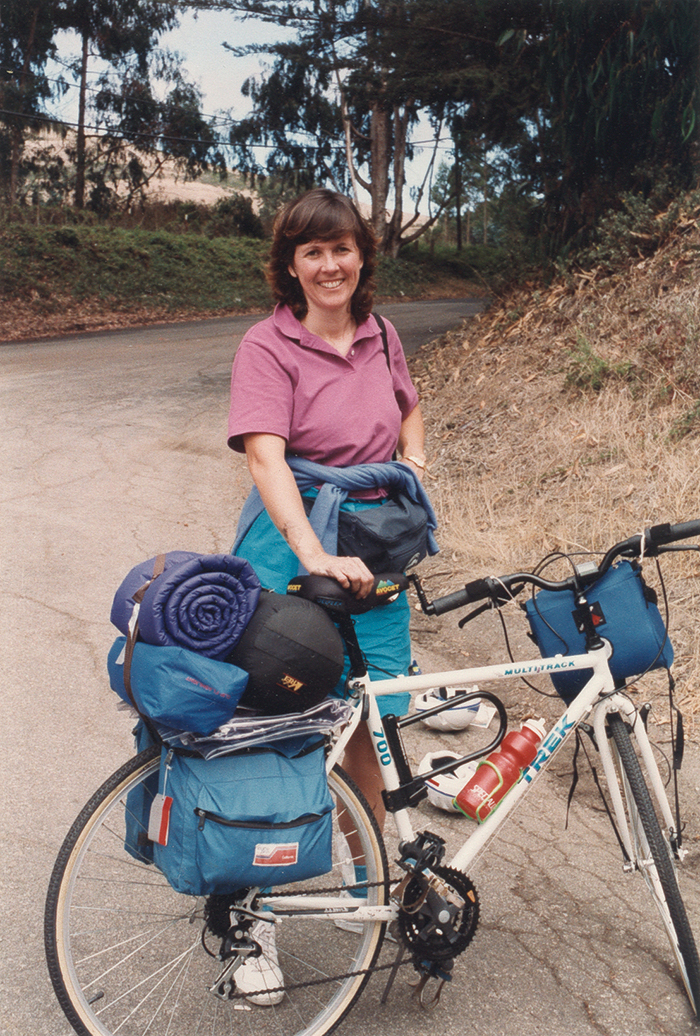
We pedaled through beauty every day.
Everything was shrouded in a golden light. The ocean sparkled like diamonds. Occasionally, flocks of gulls or herons would rise from the grasses at once, startled by our approach, arcing into the sky with their synchronized choreography — and so very close that sometimes a feather or two would spiral down to us.
We could hear sea lions jabbering at the shore, hundreds of feet down at the bottom of the cliffs, their arfs reaching our ears at full volume despite the distance, a trick of acoustics, as if we were in a whispering gallery.
Heading inland south of Santa Cruz, we pedaled through an artichoke farm near Castroville. Actual artichokes rested atop sturdy stems sticking absurdly out of thistle bushes. Thousands of them. An ocean of artichokes standing aloft, four feet high.
We camped at Morro Bay Estuary and paddled canoes. Sea lions surrounded us, popping shiny sleek heads out of the water one or two feet away. I was frozen with delight and fear. Thankfully they were feeling benignly toward us and left us to our paddling after a good long look. If I was in a bold and stupid mood, I could’ve petted their heads.
At the campgrounds, on the road, and in hostels, we met people.
Lots of cyclists and lots of regular folks. We met regular folks who couldn’t believe what we were doing; little children in the campgrounds who thought we were strange and amazing, like magic snails, traveling with all our goods right on our bikes; and chest-thumping cyclist guys in hostels who regaled us with tales of their long, heroic rides. There were quite a few who balked and sputtered when we told them our plans. “You’ve never done this before?!” they’d ask, shaking their heads incredulously. “Yeah, well, wow, if I were you, I wouldn’t even try that. You ought to catch one of them buses, load your bikes in front, they’ll take you right over Big Sur. That’s too much for you. It’s just too hard.”
I realized when we were on the other side that the reason they didn’t do it themselves, those big-talking tough-guy cyclists, was because they were afraid.
Sometimes we stayed in hostels.
These could be pretty uneven in terms of cleanliness of room and annoyingness of fellow travelers. But in general, we could tolerate eccentricity or subpar rooms because of the cheapness. Our last hostel stop, in Santa Barbara, was a little too heavy on the eccentricity. This place had been in operation for decades, and the proprietor had photo albums, stories, and letters from his many guests, which he exhaustively chronicled for us shortly after our arrival, plopping scrapbooks in our laps like treasured family wedding albums. Elisabeth and I glanced at each other, knowing we could never measure up to these former golden guests, also knowing we did not want to be paraded along at the end of the album to the next visitors. This was still on the barely tolerable side of the scale, but of course we had only been there for the first couple of hours of a two-night stay.
Our host had dozens of signs posted all over the house, like at the kitchen sink, IF YOU BREAK A WINE GLASS YOU PAY FOR IT!!!! Or around the dartboard, DARTS MUST NOT HIT THE WALL!!!! (For the love of God, let’s not play darts!) Every violation cost between five and 20 bucks. These warnings were all over the place, making us increasingly nervous about transgressing. We found it’s a pretty good bet that when someone says, YOU MUST NOT BREAK THE WINE GLASS, you’re going to break it. We did.
As many hostel owners did, our host assigned random chores to his guests. We made a silent pledge that we could still say no, we could ask for a different chore, or even just leave this bizarre house of booby traps. When it came time for the announcement of the chores, I was to type a ranting letter to the editor of the local paper in carbon-triplicate. I decided the subject of the letter did not violate my conscience, and I no longer remember what it was about. As I typed away, I wondered if my friend was being made to do something unspeakable, but since I heard no shouting or glass breaking, I shrugged and carried on, counting the minutes until we could get out of there.
Something about that hostel was so dispiriting, it jolted us right out of our travel-induced reverie. Like with a fog lifting and sunlight streaming in, my view of what we were doing changed. We had arrived here as magic snails braver than cyclist guys, who could befriend pinnipeds and pedal under a full margarita moon. I now began to suspect that we were two women putting up with a whole lot of crap and placing ourselves in increasing danger out on the highway as we pedaled ever closer to Los Angeles. More than anything, Elisabeth and I wanted to be in comfortable, normal accommodations and never have to jump through someone’s weird private-hostel hoops of crazy ever again.
My gallant brother was dispatched from L.A. and in a few hours was there to spirit us back to the real world. But not before he had to endure a half hour of chitchat with the proprietor while awaiting our return (we were somewhere, anywhere, pedaling around to be away from the hostel). My brother was just about at the end of his polite rope and looked rather frantic as we approached. We loaded up the bikes and our gear, settled our growing debts with the hosteler, and split.
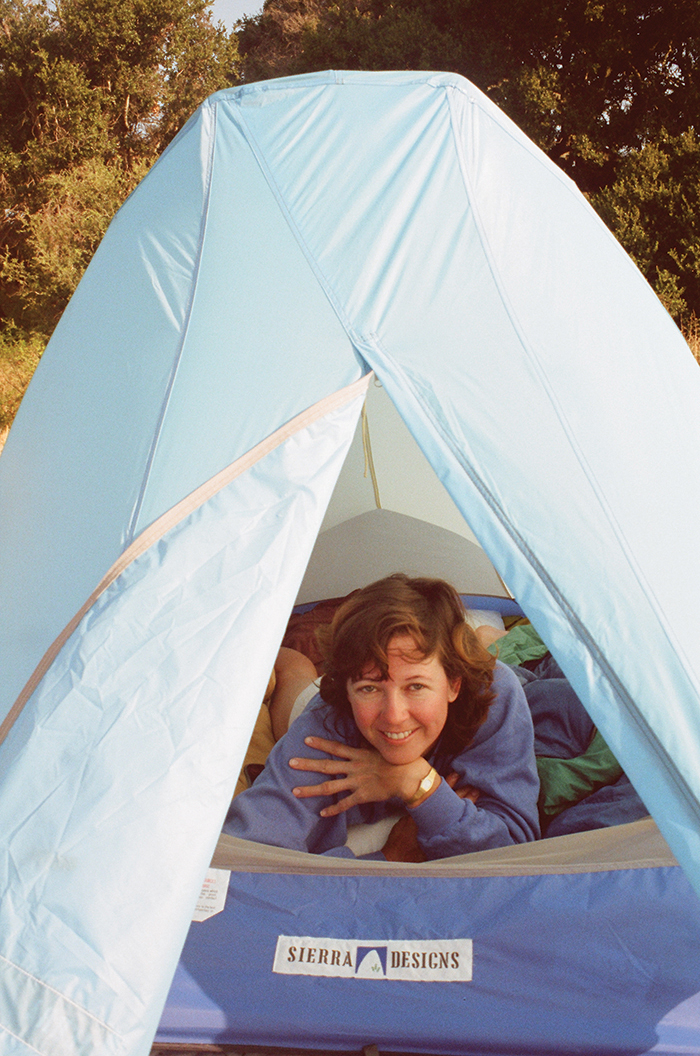
Riders we met invariably complained about the RVs.
That was the cyclist equivalent of weather or politics talk. RVs were road hogs, their drivers didn’t notice or care about cyclists, they burned too much fuel, polluted, threw trash, and were unsafe, hideous vehicles, emblematic of all that was wrong with America.
Now, I’m as happy to vilify and demonize as anyone, but the trouble with this was that we simply did not experience any of these things with RVs. We rarely ever saw them. Nevertheless, we remained wary of the hated RVs.
One sweltering afternoon near the end of our trip, we faced a long, low incline — the kind that simply did me in. As usual, my heartier friend preceded me by a few hundred yards. At the very top of the rise, my limbs were doing their shaking thing, my mouth was parched from panting, sweat poured down my forehead and traveled in rivulets around my eyes, and my sunglasses were sliding off my face. If I let go of my handlebars even for a second to adjust them, I likely would have tipped over, so I just let them slither down. A large RV was parked on the shoulder right at the top of the incline. We had to pedal quite close to it to get past while avoiding the road. When I ground my way into its shadow, a small arm with a dimpled hand shot out the window just above the level of my head. In the little hand was a cookie. I unlocked my grip on my handlebar, reached up, and grabbed that cookie like it was a brass ring, breathed a gravelly thank you, popped it in my mouth, and felt the hot sting of tears burn my eyes and blur my vision.


